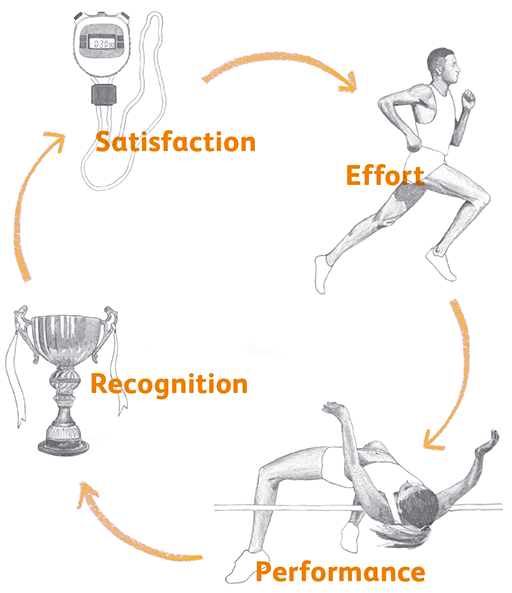Motivation is a crucial ingredient of any high performing team. Here we look at what affects motivation, and how we can ensure we are creating the right environment for our teams to win.
The Motivation Circle (see image below) is a very helpful diagnostic tool when thinking about performance. It consists of four key elements:
- Effort
- Performance
- Recognition
- Satisfaction
Remove one of these, or weaken them in any way, and you will see motivation decrease, pulling performance down with it.

Effort – Performance
People have to feel that if they work hard, they can get things done. It’s like that feeling when you’ve been going to the gym but aren’t seeing any results. Either you’re kidding yourself about how much effort you’re actually putting in, or you’ve got the process all wrong.
- Q. How are your team processes?
- Q. Do your team have adequate/appropriate resource?
- Q. Are goals that have been set reasonable?
Performance – Recognition
Your team need to know that if they work hard and get results, they will be recognised/ rewarded.
- Q. How do you recognise good/bad performance within your team?
- Q. How fair and accurate is this?
Recognition – Satisfaction
People won’t work hard for what other people want… they’ll work hard for what they want. Recognition is psychological; it depends on personality and circumstance.
- Q. How do your different team members prefer to be recognised?
Satisfaction – Effort
Even if satisfaction is high, there can still be barriers to continued and sustained effort. Some of these are:
- Fatigue or burn-out
- Misalignment
- Lack of focus
- Poor prioritisation
- Q. How are you monitoring energy levels within your team?
- Q. How can you help to prevent your team members from experiencing the situations listed above?
Practical Steps for a Motivating Environment

Digging in During Difficult Times
It goes without saying that these processes and procedures aren’t always at the forefront of our minds. When there are fires that need fighting, or urgent issues to address, it is often these foundations that get left behind.
During tougher times higher levels of resilience are required, and we need to be flexible and adapt. It’s during these more difficult times that we get to demonstrate our strengths and develop. We may have to do this at a faster pace than one might hope for, but the growth that we can hope to achieve can be a very positive shift in a somewhat bleak situation.
Avoid a Breakdown
Think of when you make a long car journey. Often you’ll be a bit more observant with your petrol and oil levels, you’ll make sure your windscreen water bottle is full and everything is working as it should. If you’re anything like me, I won’t be too bothered by a flashing warning sign on my dashboard or a low fuel notification if I’m just popping twenty minutes down the road. But nobody wants to be breaking down on the motorway. It’s the same when we find ourselves approaching, or stuck in the middle of, the notorious ‘difficult times.’ We want to have the vitals covered, be functioning correctly, like a well-oiled machine. We want the best chances of succeeding.
Rallying the Troops
It’s at times of particular stress that we can expect the machine to break down, the weak link to snap, or see the hole in the vessel. And that’s why our team foundations are of utmost importance. Communication is crucial. Motivation can be scarce when we feel like we’re fighting a losing battle. So how do we rally the troops? My family are avid football fans. And unfortunately on many occasions I have witnessed their team getting obliterated. They’re 3-0 down and we’re into the 80th minute. It’s all thoroughly depressing until they manage to pull a goal back. The change is extraordinary. The chanting erupts. Suddenly out of nowhere the fans think they can win this back. Delusion? Or a small, tantalising taste of success? It can be the same when we’re facing a long project or facing an impossible task. Creating smaller, achievable goals could just be the cheer that your team needs to spur them on.
